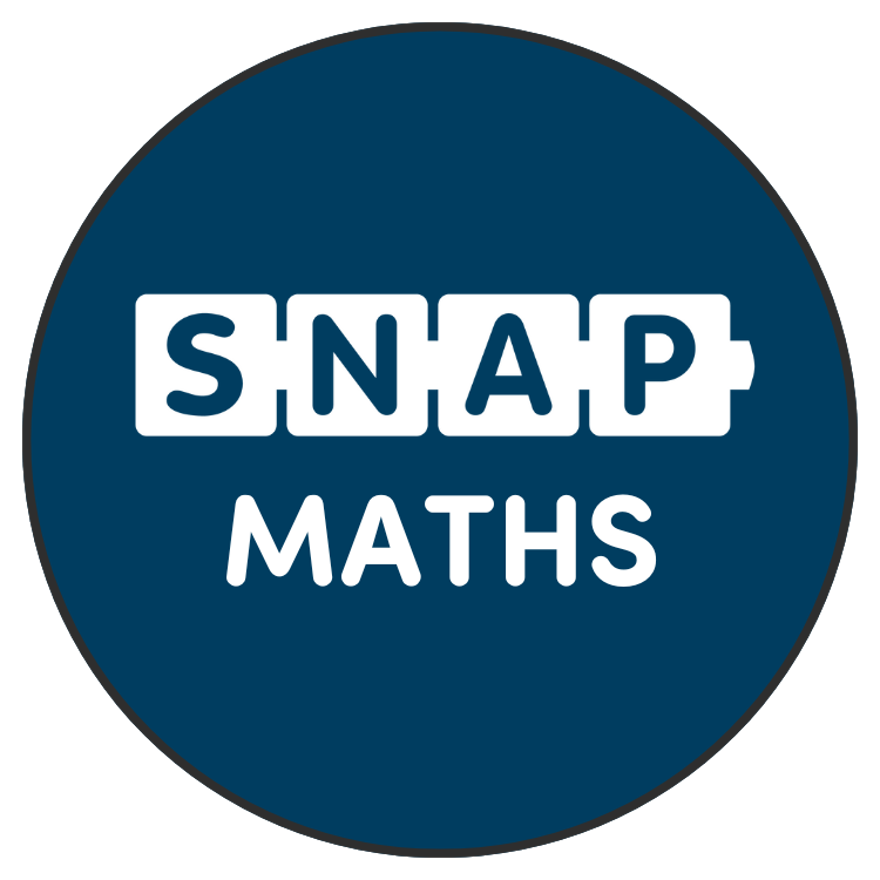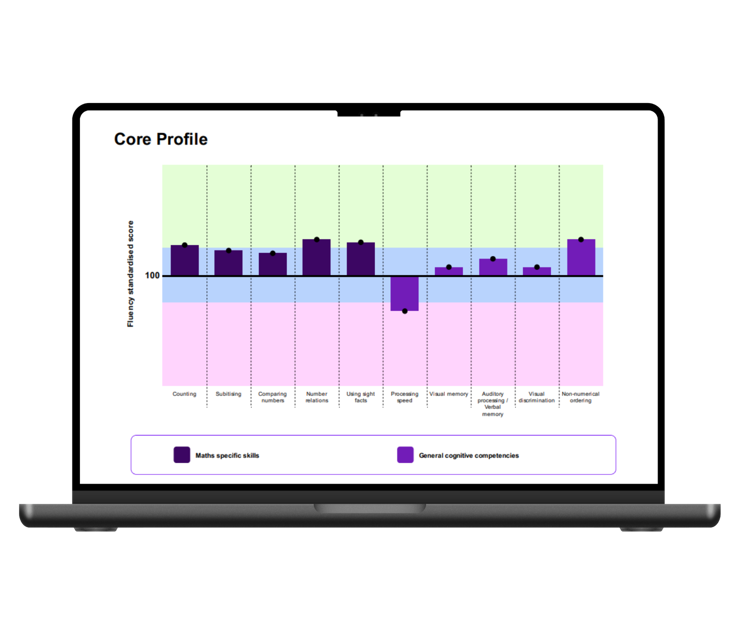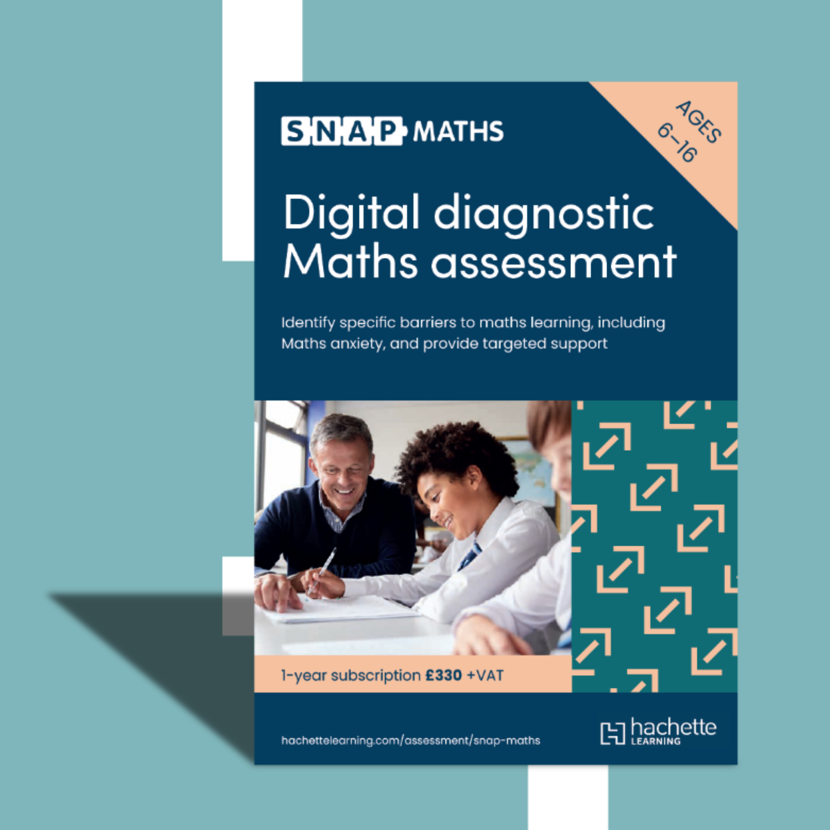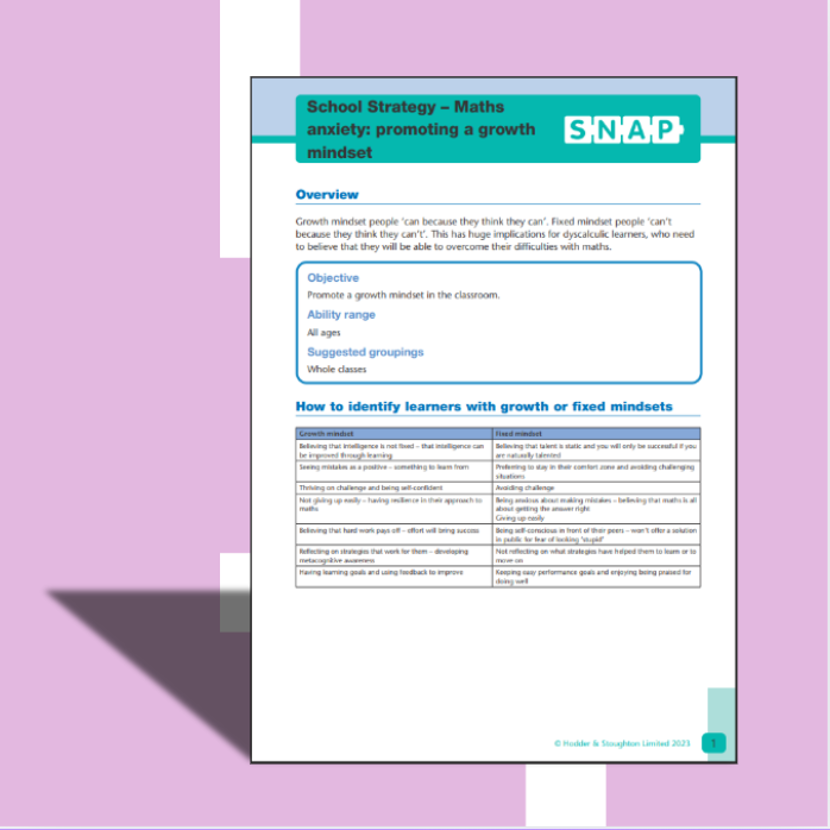Sign in for a more personalised experience
Unlock a more personalised experience to discover special offers, suggested products and more!
Sign inDon’t have an account? Click to sign up today!
SNAP Maths

Maths learning difficulties can be caused by cognitive factors, maths anxiety, or a combination of both. SNAP Maths goes beyond curriculum-based Maths assessments to examine the underlying factors contributing to under-performance to help direct where support may be needed.
Identify any specific barriers to Maths learning (including Maths anxiety), highlighting learners' strengths and weaknesses, gaining further insights into difficulties and access a bank of targeted teaching strategies so the right support can be put in place.
Understand your learners' needs
Understand your learners' needs
SNAP Maths helps you build a profile of a learner with 10 interactive activities and three optional questionnaires:
- 10 short on-screen activities – five that assess numerical skills and five that assess cognitive skills that are key for Maths learning.
- Three questionnaires support the activities and help build a holistic picture of why a learner might be struggling with maths and whether they are experiencing maths anxiety. There is a Teacher Questionnaire, Parent/Carer Questionnaire and a Pupil Questionnaire.
- The Core Profile gives an overview of a learner’s results for each of the ten activities as standardised scores for fluency and accuracy. The Questionnaire Profile reports the questionnaire outcomes, including the learner’s emotional response to Maths.

Download the brochure
Download the Digital Evaluation Pack to learn more about how SNAP Maths works and how it can help you improve Maths teaching in your school.

Discover Hidden Challenges

What schools think about SNAP Maths
SNAP Maths is a game-changer... not only do the assessments pinpoint exactly which underlying skills need to be developed, the fluency boosters provide the means to deliver that support on a self-service basis which can be at school or home
Thomas Mills High School Deputy Head of MathematicsThe pupils enjoyed using the program and were never reluctant to log on at the start of each session... We would recommend SNAP-Maths to other schools. It helps secure the basic maths knowledge that provides the foundations for future mathematical learning.
Seamer & Irton Community Primary School SENCOSNAP Maths provides a way of assessing a number of children quickly over a range of key skills. It requires the children to show their understanding independently.
Trialist Boarshaw Primary SchoolSNAP has had a clear impact on the progress of students who are using it. Its assessment tool that breaks down the different areas of mathematical ability is extremely helpful in identifying specific areas of need... SNAP Maths is an integral part of our approach to improving maths at the school.
Thomas Mills High School and Sixth Form SENDCOIt's a tool that... provide[s] teachers with valuable assessment data without increasing their workload.
Trialist Victoria Primary Academy
View a School Strategy
SNAP Maths offers a bank of over 30 School Strategies to choose from, targeting each of the areas assessed through the activities and questionnaires.
Take a look at one of the school strategies to support learners with Maths anxiety. This example looks at promoting a growth mindset in the classroom.

WINNER: SEND Resource, Product & Service
“SNAP Maths not only assesses their Maths skills, but also identifies their emotional response to Maths questions, which is important because Maths anxiety is a key barrier to student progress and this tool enables teachers to detect and address this issue more effectively.”
- BETT 2024 Judges

- 10 quick on-screen activities measure maths specific (numerical) skills and general cognitive competencies, generating a standardised score for each in a Core Profile.
Questionnaires
Take a triangulated approach and gather information from the teacher, parent/carer and the learner. Responses build a Questionnaire Profile, further detailing the learner's abilities and their emotional response to Maths.Fluency Boosters
Fluency Boosters provide intensive practice in Counting, Comparing numbers, Subitising and Number relations. Questions adapt to learners, getting harder as fluency improves and tracking progress over time. Sessions are self-guided and last for five minutes, ideally three to four times a week.Information Sheets
Information Sheets provide overviews of each difficulty in SNAP Maths, explanations of how it may present in classroom, the impact on maths learning and further reading. These help teachers understand their learner's specific needs and how they can help.Home Reports
Editable Home Reports help to explain a learner's difficulties to their parents/carers. Reports include an overview of the difficult and how it may affect their child's maths learning, as well as Home Strategies and activities.School Strategies
Once maths difficulties are identified, choose from a bank of 34+ targeted School Strategies to support individual learners and groups.
How does SNAP Maths work with Assess-Plan-Do-Review?
Assess - Identify pupils who are showing signs of maths learning difficulties through 10 short on-screen activities and three questionnaires (pupil, parent/carer and teacher).
Plan - Generate a Core Profile and Questionnaire Profile to gain a holistic picture of a pupil's strengths and weaknesses.
Do - Assign Fluency Boosters (short on-screen practice sessions) and/or choose from a large bank of tailored School Strategies to support learners.
Review - Monitor progress using the Fluency Booster graphs (if assigned), or re-assign the questionnaires to measure changing attitudes to Maths.
About the Authors
Judy Hornigold
Judy is an independent education consultant specialising in dyslexia and dyscalculia and an Associate Tutor for the BDA and Edge Hill University. Judy is a primary-trained teacher and a qualified specialist teacher of dyslexia. She’s written two books of ready-made lessons for learners with dyscalculia.
Charles Weedon
Charles taught maths and English before focussing on learning difficulties and supporting special needs. His Master’s and Doctoral degrees explored the nature of learning difficulties, and he has been an Honorary Fellow at Edinburgh University and a Visiting Scholar at Stirling. He is a registered Practitioner Educational Psychologist, and his published work has focussed upon understanding and assessing learning difficulties.
Jonathan Weedon
Jonathan has over ten years of experience as a primary educator and has a particular interest in the use of Concrete-Pictorial-Abstract (CPA) approaches to support learning in maths, and in the use of digital technology to enhance learning.
Alongside co-authoring SNAP Maths, he is currently working as a Numeracy Development Lead for his Local Authority in Midlothian, focusing on curriculum development, and supporting teachers and schools to implement evidence-based pedagogical approaches to teaching maths.
Want to chat about it?
Hear from us
Curriculum changes. New materials. Price discounts and unmissable offers. We’ll make sure you don’t miss a thing with regular email updates, tailored by subject and age group.